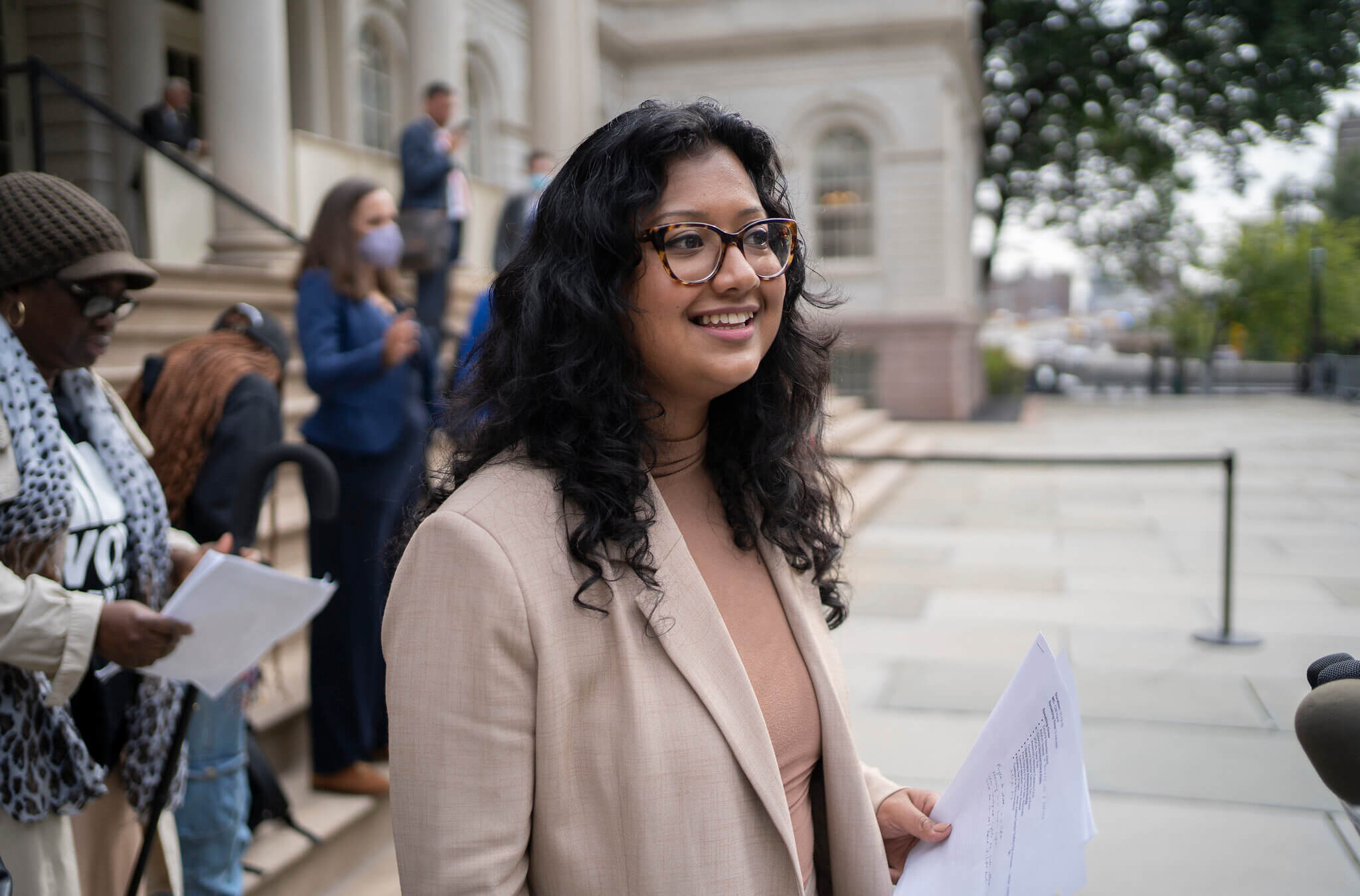She voted against creating a day to end ‘Jew hatred.’ Now she’s introducing a bill to combat antisemitism.
Shahana Hanif said she has spent her life working with Muslims and Jews to counter the hate that affects both groups

Councilmember Shahana Hanif (D-Brooklyn) on Sept. 30, 2022. Photo by William Alatriste/NYC Council Media Unit
New York City Councilmember Shahana Hanif got blasted this spring for voting against a resolution to create an annual day to “end Jew-hatred.” Some called the progressive freshman from Brooklyn antisemitic. She at the time explained that she could not get on board with the initiative because it was spearheaded by “right-wing organizations” supported by an activist who has claimed that Palestinians don’t exist.
Now Hanif is poised to introduce legislation of her own, which, she said, will address rising antisemitism at its root.
The bill, which she shared with the Forward and will unveil at the council’s monthly meeting on Thursday, would establish a commission to immediately launch a year-long campaign to educate New Yorkers about rising antisemitism and highlight the historic contribution of New York Jews to the city.
The Anti-Defamation League’s annual report of 2022 showed a 52% increase in antisemitic incidents across the city last year compared to 2021.
Jewish constituents and neighbors
A Bangladeshi-American Muslim and member of the Democratic Socialists of America, Hanif was one of only two people on the 51-member council to vote against the resolution in April. Four others abstained — one of whom later said she should have supported it.
Hanif represents a district in Brooklyn that includes many heavily Jewish neighborhoods such as Park Slope, which leans left, and Borough Park, home to many Orthodox. She was elected in 2021 to succeed former Councilmember Brad Lander, a progressive Jew, who is now the city’s comptroller.

In an interview, Hanif said the legislation is designed to focus New Yorkers’ attention on the problem of antisemitism and leverage existing resources within city agencies. Three would collaborate on the campaign: the City Commission on Human Rights, the Office for the Prevention of Hate Crimes, and the Mayor’s Office of Ethnic and Community Media. It would include television and radio spots, ads in print media and on digital kiosks, and advertisements on public transportation.
Hanif said she was motivated by her personal experience as the daughter of Muslim Bangladeshi immigrants, who raised her in the Kensington neighborhood of Brooklyn alongside Jewish neighbors.
“My life has consisted of working with our Muslim and Jewish communities to fight back against the hate and the vitriol that we are both impacted by,” she said.
After the vote
After Hanif’s “no” vote this spring, Inna Vernikov, a Jewish Republican who introduced the resolution, told those who voted against it or abstained that their “antisemitism is showing.”
Hanif at the time called the criticism unfair: “I think it is extremely disrespectful to be called antisemitic on the floor based off of just one action when I continue to show up for our Jewish colleagues and communities.”
This week Hanif said she has no hard feelings toward those outraged that the April resolution didn’t pass unanimously given the increasing number of assaults on visibly Jewish New Yorkers in recent years.
“I understand the way in which some people express their emotions toward me,” she said.
But the reaction, she added, motivated her to reach out to rabbis and other Jewish constituents to draft a measure to address antisemitism that she felt would better address the problem.
Also this year, in February, Hanif introduced a resolution calling upon the city’s Department of Education to establish a curriculum to teach respect for religious diversity and to address hate crimes against religious groups. She also supported a bill, which passed last year, creating a “Jewish Heritage Day” in the city’s public schools.
As for her campaign to counter antisemitism, she suggested that it would require an annual 30-day campaign every year and begin on May 1 to coincide with Jewish American Heritage Month. Hanif anticipates broad support for the bill, which will be considered at a public hearing before it comes to the floor for a vote.
“This is a real no-brainer,” she said.
This post was updated.
A message from our Publisher & CEO Rachel Fishman Feddersen

I hope you appreciated this article. Before you go, I’d like to ask you to please support the Forward’s award-winning, nonprofit journalism so that we can be prepared for whatever news 2025 brings.
At a time when other newsrooms are closing or cutting back, the Forward has removed its paywall and invested additional resources to report on the ground from Israel and around the U.S. on the impact of the war, rising antisemitism and polarized discourse.
Readers like you make it all possible. Support our work by becoming a Forward Member and connect with our journalism and your community.
— Rachel Fishman Feddersen, Publisher and CEO





























